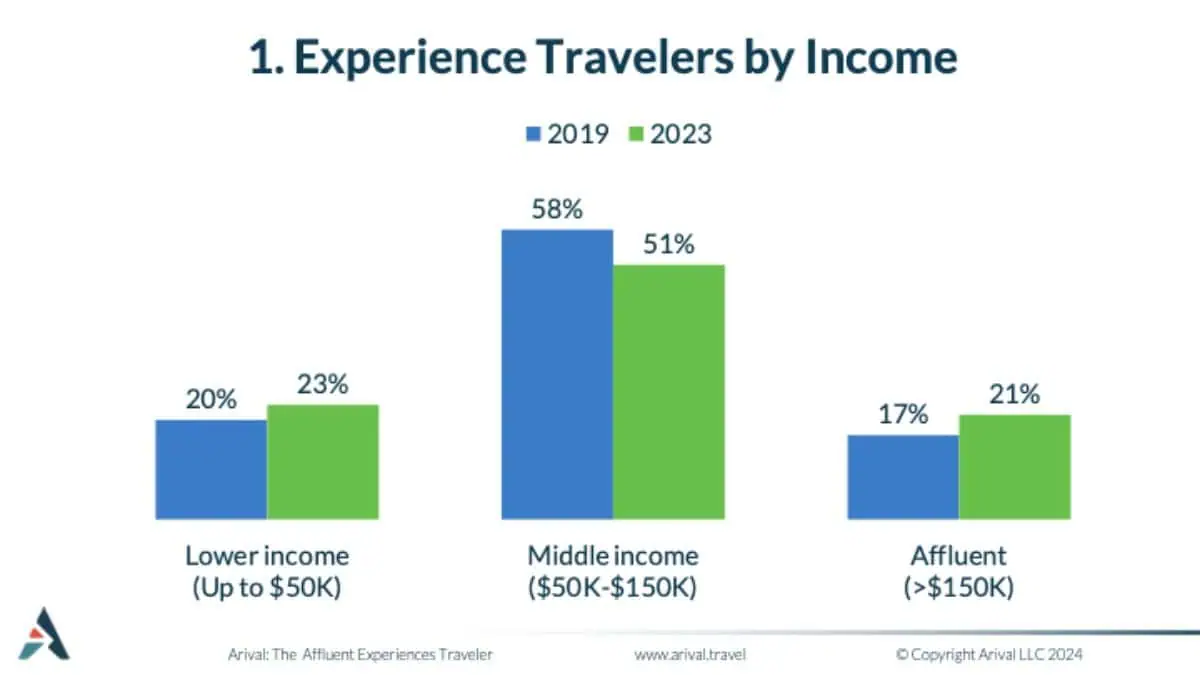
Affluent travelers drive nearly half of all spend on experiences
A new report from Arival, the global research authority on the travel experiences sector, reveals that affluent travelers – those with an annual income of $150,000 or more – are the driving force behind the tours, activities, and attractions market. They generate 50% of total traveler spend on day tours, and more than 40% of all spend on activities and attraction tickets. travel experiences
The report, titled “The Affluent Experiences Traveler,” has been unveiled ahead of the Arival 360 conference, which takes place in San Diego from September 30-October 3, where it will be a key theme.
The report uncovers the unique preferences and behaviors of this high-value traveler segment, which is increasingly places experiences first in their travel planning and priorities.
Hotels, destinations, airlines, and travel agencies as well as travel experience companies must pay close attention to this critical and growing segment of the traveler population. The report is part of the 2024 U.S. Experiences Traveler study that surveyed travelers across various income levels to understand their behaviors and preferences when it comes to booking and experiencing tours, activities, and attractions.
Key findings:
- Affluent travelers account for a disproportionate share of bookings and spending in the experiences sector. While representing only 21% of all travelers, they a third of bookings and 46% of total spending on tours and activities.
- Young affluent travelers aged 18-44 are especially impactful. They spend 50% more on activities than other travelers.
- Experiences play a crucial role in destination selection for the majority of affluent travelers – across age groups. 77% of older affluent travelers and 74% of younger affluent travelers say that available activities and experiences were a very primary reason for choosing their destination.
- Affluent travelers are more likely to plan and book experiences in advance – often before booking other elements of their trips. 59% of younger affluent travelers and 27% of older affluent travelers plan and book experiences more than four weeks in advance, compared to 22% of middle-income travelers and 28% of lower-income travelers.
- Older affluent travelers still like to plan and book flights and lodging in advance – whereas younger affluent travelers leave this until the last minute. Around 70% of older affluent travelers plan and book flights and hotels more than four weeks in advance. In contrast, 70% of younger affluent travelers do this less than a week from the date.
- Younger affluent travelers (aged 18-44) are particularly engaged in the experiences market. They account for 67% of bookings and 70% of spending among affluent travelers.
- Sustainability and personal values are key factors in experience selection for affluent travelers. 87% of younger affluent travelers prioritize brands and products that align with their values, compared with 56% in other income groups. 81% of young affluent travelers also say that sustainability influences their experience choices, compared with 44% of other travelers.
“The widening wealth gap has been a societal megatrend for the U.S., and we’re seeing very clearly how this is shaping the present and future of travel – and the travel experiences sector,” commented Douglas Quinby, CEO and co-founder of Arival. “Creators and sellers of tours, activities and attractions must have a clear strategy to meet the expectations of an increasingly important affluent traveler, who is accounting for a greater share of overall travel and experiences demand,” Quinby added. “Increasingly these travelers are choosing where to go, and where to stay, based the experiences they wish to pursue. Every travel organization – from accommodations and transportation to destinations and travel sellers of all shapes and sizes – must start thinking experiences first. Their most important customers already are.”
The report also highlights the growing importance of social media and online reviews in the decision-making process for affluent travelers. Younger affluent travelers, in particular, rely heavily on platforms like YouTube, Instagram, and TikTok for research and inspiration.
The Wealth Gap Impact travel experiences
The widening wealth gap is a societal megatrend for the U.S., and the big question is what will be its long-term effects on travel and experiences? Here are a few thoughts:
- Travel may come to rely on more and more dollars coming from a smaller subset of travelers. Fortunately, these travelers are especially hungry for experiences — however, their preferences may differ from the general traveler, meaning some operators may need to adapt their offerings to attract these travelers.
- The largest traveler segment – the middle-class traveler – may be increasingly vulnerable during downturns and more price-sensitive even during upswings.
- Travel brands and experienced operators will need to have a clear understanding of their customer segments and consider pricing and product offerings tailored to these customer groups, such as private tours or different service-level tiers.
These findings and more will be discussed in-depth at the upcoming Arival 360 event in San Diego, taking place from September 30th to October 3rd. The event will bring together leading operators, sellers, and distributors in the in-destination experiences industry to explore the latest trends, challenges, and opportunities in the market. travel experiences










